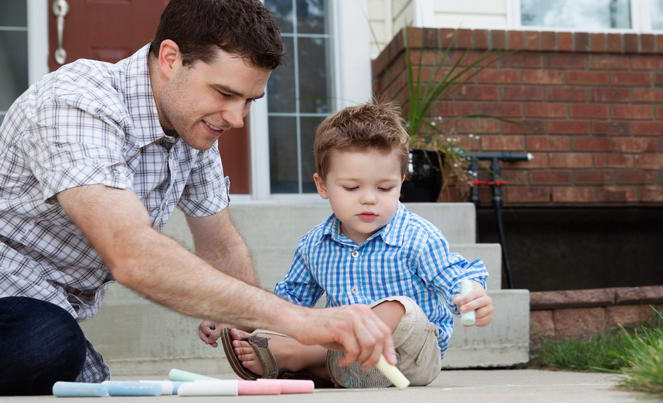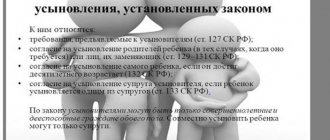With whom do children most often stay after the end of a marriage?
Although it gives both parents equal rights to common children, an analysis of the practice of courts making decisions on the place of residence of minors during a divorce shows that in 90% of cases they are left by their mothers. The courts make this decision based mainly on the needs of children, because the basis of the norms prescribed in the IC is the protection of the interests of minor citizens.
However, sometimes the court decides to leave the children with the father if the former head of the family manages to prove that this option for distributing responsibilities is more in the interests of the minors.
Learn more about how the court determines who a child stays with during a divorce.
Features of divorce in the presence of children under 3 years of age
If spouses whose children are under 3 years of age plan to divorce, the divorce must be carried out exclusively in court. In addition, if the baby is under 1 year old, the husband does not even have the right to file for divorce without the consent of his wife ().
As a rule, children under 3 years of age remain with their mother. Therefore, after the court accepts the application for divorce, the father is obliged to support the child, also paying alimony to his mother, who is caring for her son or daughter ().
If agreement on child custody, the procedure for communication with the father and the payment of alimony is not reached in a voluntary agreement, the court proceedings, as a rule, drag on for a long period.
Is it possible to prohibit a father from seeing his child?
During normal interaction between a father and his son or daughter, no one has the opportunity to interfere with their communication. Restrictions may be imposed by the court in the following circumstances:
- threat to life, development and health posed by the father;
- abuse, violence or threats;
- failure to fulfill duties;
- alcohol/drug addiction;
- abuse of rights.
When considering the case, the court may set limits on the time of interaction or limit the father’s rights. But this is only possible if there is evidence of unacceptable actions.
Divorce and rights of spouses
The Family Code of the Russian Federation () establishes the exclusive right of parents to support and raise their children. Despite the fact that divorce terminates the mutual obligations of the spouses towards each other, parental rights and responsibilities regarding common minor children () remain unchanged.
The legislation gives the right to a parent, who will live separately after a divorce, to communicate freely with his offspring, to take part in his upbringing and education ().
Learn more about what and how the rights of spouses during a divorce are regulated.
Abuse of rights to a child
In the Family Code of the Russian Federation you can find such wording as “abuse of parental rights.” This act is grounds for deprivation of parental rights, that is, it represents a serious violation of the rights and interests of the child.
Very often, after a divorce, the former spouse tries in every possible way to protect the second spouse from communicating with the minor, including motivating his actions with abuse of rights. What is abuse of parental rights?
Resolution of the Plenum of the Supreme Court of the Russian Federation dated May 27, 1998 N 10 “On the application of legislation by courts in resolving disputes related to the upbringing of children” gives an explanation of this term, meaning by it the use by parents of their rights contrary to the interests of children.
| No. | Options for abuse of rights | Examples |
| 1 | Deliberately creating obstacles to a child’s education by one of the parents | Keeping him from visiting an educational institution whose choice the other parent does not agree with |
| 2 | Accustoming a child to an antisocial lifestyle | The second parent, using his right to communicate with the child, instills in him immoral qualities and provokes him to do unpleasant things. |
| 3 | Creating a negative image of the father or mother | Deliberate insult and humiliation of the second parent in the eyes of the child |
| 4 | Other actions arising from abuse of parental rights contrary to the interests of children | Involvement in committing a crime, inducement to engage in prostitution |
Equal rights of parents
The legislator makes no distinction between the rights of a mother and father, either during marriage or after its dissolution. Divorced parents are given equal opportunities to both independently raise their children and to fully participate in their maintenance and upbringing.
When it comes to determining the place of residence of children, custody of them, payment of child support and the procedure for communication with the other parent, the best course of action is to conclude a voluntary agreement between the former spouses.
In the Family Law of the Russian Federation there is no mention of the fact that one or another parent has priority rights to common children.
The rights of the father and mother to the child during a divorce are a priori equal. Therefore, in the event of a dispute, each of them will have to justify their claim to receive custody of the minor before the court.
Father kidnapped a child
Women are very emotional individuals. They are so worried about their child that they may often misjudge some of the actions of the baby’s father. For example, dad took the child to his place for the weekend and does not give it back. Mom immediately begins to think that he stole the child.
First of all, it is necessary to find out why the child has been with his father for a long time. Perhaps he fell ill and his father did not have time to report it. Or maybe the father took the child to grandma, etc. In this case, there can be no talk of any abduction if the father does not hold the child against his will.
The application must be accompanied by documents confirming that the baby lives with the mother. This may be a court decision or an agreement to determine the child’s place of residence, concluded by the parents during the divorce. It would not be superfluous to provide a certificate of family composition, which also indicates that the mother and child live together.
The father's actions in relation to the child cannot be qualified under Article 126 of the Criminal Code of the Russian Federation (kidnapping). In this case, there is a violation of a court decision or the terms of an agreement on determining the child’s place of residence.
We suggest you read: How to obtain child custody during a divorce
If the parent was at one time deprived of parental rights, then he lost the legal connection with the child. Accordingly, what can be prosecuted for without permission is kidnapping under Article 126 of the Criminal Code.
Father's parental rights after divorce
The Family Code of the Russian Federation (Article 66) determines what rights a father has to a child after a divorce in Russia. These include:
- obtaining information about the baby from the educational institution where he is located, from the medical organization where he is temporarily staying, directly from the mother or through social protection institutions;
- permission or prohibition to take a minor out of the state;
- protection of his rights in various instances;
- expression of consent or disagreement to change the surname, and so on.
In addition, no one has the right to challenge the father’s right to see his child after a divorce. The law prohibits the spouse from interfering with such meetings.
If the order established by the court is violated, the ex-spouse can appeal to the judicial authority with a demand to restore justice.
The legal rights of a parent to minor children after divorce cannot be realized only if:
- they are limited to the court;
- there is an act of deprivation of his parental rights.
Is it possible to ban meetings with children?
If a parent pays child support, is not addicted to alcohol or drugs, and does not lead an antisocial lifestyle, he cannot be deprived of the right to see his children. However, the former spouses will have to establish how much the father can see the child during a divorce.
Let's face it: how often an estranged parent can see their minor child is one of the main causes of disagreement between parents. Civilized spouses resolve this issue by concluding an appropriate agreement. The document contains details of the meetings:
- Schedule.
- Duration.
- Periodicity.
- The conditions in which the meetings will take place.
As a rule, a standard meeting schedule involves spending weekends together several times a month, communicating by phone or in person during the week, and sharing a vacation.
Unfortunately, a peaceful solution to the issue is a rare occurrence among divorced couples. Therefore, in most cases, how much the father can see the child after a divorce under the law has to be established during the trial.
When making a decision, the judge takes into account a number of factors relating to the children:
- their interests:
- age;
- employment;
- degree of attachment to mother/father living separately.
In addition, the court takes into account the moral principles of the former spouses.
If necessary, in a new lawsuit, the court is ready to reconsider the original decision regarding how much time the father can spend with the child after the divorce. This may apply to situations where the mother fears that communication with the other parent poses a danger to the baby.
To start proceedings, it is not enough just a statement from the mother listing the reasons. She must provide documentary evidence of her claims: witness statements, certificates, documents from medical institutions, etc.
If the court decides that the facts reported by the mother are true and may in fact have a negative impact on the health or mental state of the children, a ban will be placed on the father’s communication with them. In some cases, the court allows communication in the presence of the mother.
How to resolve a dispute about children during a divorce - a lawyer answers
Divorce in most cases is not a pleasant event. The painful situation can become even more complicated if the spouses have common minor children. The most common questions faced by many couples on the verge or stage of divorce are answered by the managing partner of the Law and Family Mediation law office, lawyer, mediator Elena Zhdanovich.

The couple have not been living together for several years, but are still officially married. We decided to get a divorce. Which court should they submit documents to if they live in different cities? Does it depend on who initiates the divorce? Is there a difference if minor children live with one of the spouses?
The general rule of jurisdiction applies: the claim is filed at the place of residence of the defendant. If minor children live with the plaintiff, then the claim for divorce can also be filed at the plaintiff’s place of residence, i.e. the one who initiated the divorce.
What documents must be submitted to the court and what fee will have to be paid?
The court must submit a statement of claim with a copy for delivery to the defendant, the original marriage certificate, a copy of the personal account (from the place of residence), if there are minor children - copies of the children’s birth certificates, as well as a receipt for payment of the state fee. The state fee for filing a claim for divorce is 4 BV. If a remarriage is dissolved, the state duty is 8 BV.
A dispute arose between spouses who decided to divorce about which parent the minor children would live with after the divorce. What aspects (child’s affection, parents’ financial situation) does the court take into account when deciding this issue?
The court takes into account which of the parents shows more care and attention to the child, the child’s age, attachment to each of the parents, the personal qualities of the parents, the possibility of creating appropriate material and living conditions and a moral and psychological atmosphere, and ensuring an appropriate level of upbringing. If the child has reached the age of 10, then his opinion must be taken into account. In this case, the child’s opinion, at the request of the court, is revealed by the guardianship and trusteeship authority at the place of his residence.
The husband does not agree to the divorce. But life with him is simply impossible: he constantly argues and drinks. Can they get divorced without his consent? There is a minor child in the marriage.
No one can force you to live with a person with whom living with is impossible and unbearable. However, divorce is a specific procedure strictly regulated by law.
When accepting a claim for divorce, the court, in accordance with current legislation, gives the spouses a three-month period to take measures for reconciliation.
During the trial itself, all the circumstances of married life, the possibility and expediency of preserving the marriage are carefully examined, and the fact that there is a minor child in the family is taken into account. If necessary, the court may grant a period of reconciliation within six months. However, if the additional period does not help restore the family, the marriage will be dissolved, despite the lack of consent of the defendant.
My husband and I are divorced. In the statement of claim that the plaintiff filed, there was no request to establish the procedure for communication with the children and the participation of the father in their upbringing. Now the ex-husband insists that the children live with their parents alternately: a week with their mother, a week with their father. The mother is against this order, but agrees that the children periodically spend time (for example, on weekends) with their ex-husband. What should a woman do? Should I go to court again or can the issue be resolved in some other way?
The most important thing in disputes related to the order of parental participation in raising children is that they first of all take into account the interests and needs of their children. The ideal option is to sit down at the negotiating table and decide how the children’s lives will be organized in the new conditions, when parents live separately. If this does not work out, the mother can file a lawsuit to determine the children’s place of residence with her and establish the procedure for the father’s participation in their upbringing.
The husband did not take any part in raising the child. Everything rests on my shoulders. We are currently living separately. Moreover, I do not know his exact place of residence. How to get a divorce in this situation? Is it necessary for a spouse to be present in court? The child is underage.
A claim for divorce can be filed at your place of residence if a minor child lives with you. The application indicates the place of registration of the defendant, your husband, known to you, and his contact information. The court will make efforts to properly notify him of the date of the hearing. If your spouse does not appear at court hearings and the judge is convinced that your family has broken up and it is impossible to save it, the court has the right to decide on divorce. As a rule, in such situations, the courts issue a default judgment, which can be canceled if the defendant proves that he was absent from court for valid reasons and could not inform the court about it in a timely manner.
My husband and I are divorced and have not spoken for a long time. When the marriage was dissolved, he did not raise the question of participation in raising his son. Is his permission now required for his child to travel abroad on vacation?
According to current legislation, a minor child can travel outside of Belarus accompanied by one legal representative, i.e. No second consent is needed. However, if you plan to travel to countries where a Schengen visa is required, the embassies of these countries require the consent of the second spouse to travel. Therefore, it is better to obtain such consent from the father and have it certified at a notary office.
It is known that a husband cannot file for divorce if his wife is pregnant or their joint child is not yet 3 years old. Does this rule apply if an accident occurs and the child dies at this age?
According to Art. 35 of the Code on Marriage and Family (KoBC), divorce is unacceptable during the wife’s pregnancy and before the child reaches the age of 3 years without the written consent of the other spouse to divorce, provided that he lives with the child and provides parental care for him, for except in cases where paternity of the child is recognized by another person or by a court decision, information about the husband as the father of the child is excluded from the record of the child’s birth.
Accordingly, this rule will not apply in the event of the death of a child.
Is a man obliged to support his ex-wife if she agreed to divorce while pregnant or having a child under 3 years of age? After all, the woman is on maternity leave and, in fact, cannot support herself.
According to Art. 30 CoBS, a former spouse in need of financial assistance retains the right to receive maintenance from another former spouse who has the necessary means for this:
- until the common child reaches 3 years of age, if he (she) cares for this child;
- until the common disabled child reaches 18 years of age, if he (she) is caring for this child;
- for the period of caring for a common disabled adult child.
An ex-wife in need of financial assistance retains the right to receive maintenance from her ex-husband, who has the necessary means for this, during pregnancy, if the pregnancy occurred before the divorce.
At the same time, Art. 32 of the CoBC establishes that the court may, taking into account the short duration of the spouses’ marriage or the unworthy behavior of the spouse demanding the payment of alimony, release the other spouse from the obligation to support him or limit this obligation to a certain period.
Also, the right of one spouse to receive maintenance from the other is lost if the conditions that served as the basis for this no longer exist, and also if the divorced spouse receiving maintenance enters into a new marriage. If the funds were collected by a court decision, the spouse obligated to pay them, in the cases provided for by this article, has the right to apply to the court with a claim to exempt him from further payment.
How is the issue of alimony resolved if, as a result of divorce, one child remains with the mother, and the second with the father?
In accordance with Art. 91 KoBS, parents are obliged to support their minor children. If they do not provide maintenance to their minor children, alimony is collected from the parents in court.
According to Art. 92 CoBS, if children remain with each of the parents, alimony from one of them in favor of the other, less wealthy, in the absence of an agreement on children, an agreement on the payment of alimony, and also if the amount of alimony is not determined by the marriage contract, is established in a fixed monetary amount, collected monthly and determined by the court in relation to the amounts established by this article, taking into account the financial and marital status of the parents.
What surname will the child have after his parents divorce? Can the mother apply to change his last name?
Art. 70 of the Code of Laws of Ukraine stipulates that the termination of a marriage between parents or its recognition as invalid does not entail a change in the child’s surname.
If the parent with whom the child remained to live after the termination of the marriage or its recognition as invalid or after entering into a new marriage, wants to assign his surname to him, the guardianship and trusteeship authority has the right to allow this based on the interests of the child.
Changing the surname of a child who has reached 10 years of age is in all cases made with his consent, which is obtained by the guardianship and trusteeship authorities.
The parent whose last name the child bears is notified of the filing of a petition to change the child’s last name, and his opinion, along with other circumstances, is taken into account by the guardianship and trusteeship authorities when resolving this issue.
Upon a joint application of the parents of a child under 16 years of age, the guardianship and trusteeship authority has the right, based on his interests, to allow the change of the surname assigned to him to the surname of the other parent, unless otherwise provided by this Code.
You have a child together with a foreign citizen. Until recently, the whole family lived abroad, in the spouse’s homeland. I was forced to leave there because living together became impossible. How to get a divorce if your spouse does not agree to it? How to resolve the issue of my son’s residence? I think that the child will be better off with me. The husband threatens to take his son away.
As a general rule, an application to initiate a case is filed with the court at the defendant’s place of residence. However, it is possible to file for divorce in Belarus. According to Art. 231 CoBC, in the republic, the dissolution of marriages of Belarusians with foreigners, at least one of whom has a permanent residence permit in our country, is carried out in accordance with the legislation of Belarus. For example, a claim against a defendant whose place of residence is unknown or who does not have a place of residence in Belarus may be brought at the location of his property or at his last known place of residence in the republic. Also, a claim for divorce can be brought at the place of residence of the plaintiff, when he has minor children with him or when, for health reasons, the plaintiff’s travel to the defendant’s place of residence seems difficult for him.
Divorce is carried out by the court according to the procedure of claim proceedings. When accepting a claim for divorce, the court gives the spouses a three-month period to take measures for reconciliation, as well as to reach an agreement on common minor children and division of property. After this period, the marriage is dissolved if the court finds that the spouses’ further life together and the preservation of the family have become impossible. When considering a claim, the court takes measures aimed at preserving the family and has the right to postpone the hearing of the case, assigning the spouses an additional period for reconciliation within six months.
Thus, the disagreement of one of the spouses to divorce may become a reason for granting an additional period for reconciliation, but not a basis for refusing to dissolve the marriage.
To resolve the issue of the son’s residence, it is necessary to submit a request to the court to determine the child’s place of residence. In accordance with Art. 74 KoBS, the child’s place of residence is considered to be the place of residence of his parents. In this case, the place of residence of the child in the event of separate residence of the parents due to divorce or for other reasons is determined by mutual consent of the parents. Their disagreements on this matter are resolved in court based on the interests of the child.
When resolving a dispute about a child’s place of residence when parents live separately (at different addresses) (regardless of whether they are married), the court takes into account his age, attachment to each of the parents, brothers, sisters, other family members, moral and other qualities of parents. The relationship that has developed between each parent and the child, the degree of care and attention shown to him by the parents, taking into account their type of activity, work schedule, and other living conditions are taken into account. The possibility of each of them providing appropriate material and living conditions for the upbringing and development of the child, as well as other circumstances prevailing in the place of residence of each of the parents, is assessed.
In addition, in this situation it is necessary to take into account the fact that the father has citizenship of another country. If the spouse repeatedly threatens to take the child away, then this is a reason to fear the illegal removal of the child from Belarus. In accordance with Art. 12 of the Law “On the procedure for departure from the Republic of Belarus and entry into the Republic of Belarus of citizens of the Republic of Belarus”, if one of the legal representatives does not agree with the procedure for departure from the Republic of a minor provided for by this law, he may apply to the court to determine otherwise procedure for leaving the country. In this regard, it is also necessary to submit demands in court to determine otherwise, namely, only with the consent of the mother, the procedure for the minor son’s departure abroad.
He married a woman with a child from his first marriage and adopted him. After several years of marriage they decided to get a divorce. Can an adoption be canceled to avoid paying child support?
According to Art. 138 KoBS, the adoption of a child can be canceled if the adoptive parents:
- recognized as incompetent or partially capable;
- are patients with chronic alcoholism, drug addiction, substance abuse;
- avoid raising and (or) maintaining a child;
- abuse parental rights and (or) abuse an adopted child;
- cannot fulfill parental responsibilities due to the presence of a disease included in the list provided for by the Decree of the Ministry of Health of March 30, 2010 No. 36 “On approval of the list of diseases for which parents cannot fulfill parental responsibilities”;
- lead an immoral lifestyle, which has a harmful effect on the adopted child.
The adoption of a child may also be canceled in other cases provided for in part one of Article 125 of this Code (when the adoption itself was illegal), if this is necessary to protect the rights and legitimate interests of the child. In this case, the wishes of the child who has reached ten years of age must be taken into account.
Thus, it is quite difficult to cancel an adoption.
The ex-husband filed a claim to establish the order of communication with a young child. Among other things, he indicated a request to allow him to take his son abroad every year on vacation. His wife is against this point, although in general she approves of his desire to participate in raising his son. Can a wife somehow prohibit her husband from traveling abroad with his child?
All questions about the forms and methods of raising children, their education, attitudes towards religion, organization of free time and others are decided by both parents by mutual agreement.
Disagreements between parents regarding issues of raising children are resolved in court. In such claims, the court, taking into account the specific circumstances, must determine how often the parent will communicate with the children (number of meetings per month, per week, on weekends), in what place (in the mother’s, father’s house, at school, in kindergarten, etc.) etc.) and for how long (a day, a day, several hours, for the period of parental leave, etc.). In this case, the age of the children, state of health, attachment to each of the parents and other circumstances that can have an impact on the physical and mental health of the children and their moral development are taken into account.
In accordance with Art. 60 of the Civil Procedure Code, the defendant has the right to defend against the brought claim. He can formulate his position in objections to the claim or file a counterclaim. The position must be argued from the point of view that the communication procedure declared by the plaintiff does not correspond to the interests of the child, violates his daily and rest schedule and, possibly, will harm the child’s health. Restrictions on the father and child traveling abroad on vacation must also be motivated and supported by evidence (medical certificates, etc.).
Can the court help his grandparents (mother and father of the ex-husband) get permission to see the child? The fact is that after a divorce, the ex-wife is forced to allow her ex-husband to communicate with the child. As for participation in the upbringing of grandparents, this issue has not been resolved. Now my wife is categorically against such meetings, not considering them necessary.
In accordance with Art. 185 KoBS, all children have the right to live in a family surrounded by parents and close relatives, to their care and attention.
According to Art. 78 KoBS, grandparents have the right to communicate with their grandchildren. If the parents, guardians, or custodians of the child refuse to provide the grandparents with the opportunity to communicate with their grandchildren, the procedure for communication is determined by the court.
According to BELTA
Consent for children to travel abroad
When deciding whether the consent of the other parent is required for a child’s trip abroad, the following circumstances should be taken into account:
- If a child or teenager leaves the country with his mother and for a certain period of time (for example, to participate in competitions, olympiads, competitions), it is not necessary to obtain the father’s consent.
- If the mother does not accompany a minor family member, the permission of both parents will be required (Article 20).
- If the father is against the departure of his son or daughter, the dispute will be resolved only in court (Article 21).
One of the parents does not have the right to make an independent decision to take their son/daughter for permanent residence to another country. To do this, he must obtain the consent of the other parent.
What responsibilities does a father receive after a divorce?
Regardless of the relationship between spouses after divorce, the father retains the same rights and responsibilities for the child as before (Article 63 of the RF IC).
Until the baby reaches adulthood, the father is obliged to provide financial support and take part in his spiritual and physical development. The father's responsibilities also include:
- caring for children's health;
- assistance in obtaining education;
- providing comprehensive assistance in case of need for treatment or additional care.
From a legal perspective, rights and obligations are inextricably linked. If the father shirks his duties, he may lose his rights.
We recommend that you familiarize yourself with how child support is determined.

Some nuances
Often the spouse, out of resentment, wants to annoy his ex-lover. And for this he uses such a method as manipulation with the help of a child. First of all, it is necessary to understand that personal squabbles between a man and a woman can lead to a child suffering. His physical and psychological health, mental comfort is the only thing that parents should care about.
To avoid situations where the father picks up the baby, takes him to another city, etc., it is better to establish good friendly relations with your ex-spouse. At the same time, it is still worth documenting the legal relationship regarding the upbringing and maintenance of the child. And in the event that the father may pose a danger to the baby, it is advisable to raise the issue of depriving him of parental rights.
Is it possible to leave children with their father after a divorce?
Although most children continue to live with their mother after their parents separate, more and more often men do not agree with established traditions and begin to fight for the right to keep their children.
To protect his right to live together with his children, the father must file a statement of claim, setting out the corresponding requirement. The claim should be accompanied by documentary evidence that he will provide for the financial needs of the children better than the mother, will give them proper upbringing and will be able to devote enough time.
A child who has reached the age of 10 can independently express a desire to live with his father, which the court must take into account.
Detailed recommendations on how to leave a child with the father during a divorce.
Judge's criteria when justifying the time of communication between a child and his father

In Russia, the law does not prohibit the departure of a minor citizen with one of the parents. This means that the father can take the child to any country without the mother's permission. This rule is spelled out in Art. 20 Federal Law No. 114 “On the procedure for leaving the Russian Federation and entering the Russian Federation.”
On the one hand, taking a child abroad by one parent is very convenient. Especially if the parents do not live together. There is no need to look for the other parent to obtain permission if the child urgently needs to be taken to another state for treatment, education or vacation.
We invite you to familiarize yourself with: GPC Agreement and Contract Differences
On the other hand, if the relationship between the former spouses is difficult, one of them can take the baby away without any problems. However, there is a legal mechanism to protect the interests of the child in such a situation.
If the mother is worried that the father may take the child abroad, it is necessary to file a lawsuit in court for disagreement with the departure of the minor. This right is provided for in Art. 21 Federal Law No. 114. If there is a judicial act that has entered into legal force, the customs service will not allow the parent and child to pass. Thus, it will be impossible to leave the Russian Federation.
In cases where an agreement cannot be reached, the guardianship and trusteeship authorities, as well as the court, come to the rescue. It is these authorities that will resolve the conflict that arises regarding communication with children and the implementation of education in general.
Here the court will rely on a large number of factors when determining the order of communication with the child: the age of the children, health, psychological indicators, namely the level of attachment to each of the parents, and of course, the conditions of the meetings, the possible setting. The complexity of such trials is that Every family is unique in its own way.

In some cases, their own problems, conflicts, difficulties, conditions. All this is important to take into account when making a decision, and you definitely cannot act based on previous cases. In each family, you can individually determine the characteristics of communication between spouses, children with them and other similar aspects, which plays a significant role in the formation of schedules.
Often, the father does not take into account the interests of the child when establishing the order of communication with him; he wants to take the small child away for a long time, which is impossible, since he may need the mother’s company too much due to his age. And there are a lot of such examples, so each family needs to be approached individually.
This is usually due to the fact that a child at a young age becomes more attached to his mother, especially if he lives with her constantly. The father is obliged to take this factor into account.
Often the schedule proposed by the father involves the child staying with him at night, for example, when the man takes him away for the weekend. This is possible, but only if the court is convinced that the father has suitable living conditions for this.
When a man does not have his own apartment or house, he will be denied this type of communication, as with any other long-term pastime.
Another important point may be the health status of the children. They often have some diseases, including chronic ones. In this case, long-term departures may also be prohibited. It is necessary to provide medical certificates and confirmation from doctors that the chosen holiday option will not be harmful to health.
He also needs to properly provide medical examinations, tests and other medical services, which will be problematic to provide upon departure. All this may be grounds for denying the father the opportunity to spend an entire vacation with the child.

The next important evidence is the opinion of the guardianship and trusteeship authorities about the possibility of spending the maximum amount of time with the father. They examine all conditions, including the characteristics of the man himself and the relationship between him and the child. As a result, a conclusion is issued, which the court looks at first when making an appropriate decision.
Typically, the conclusion of the guardianship and trusteeship authorities is not based on how the process of raising a child is going, or what the relationship is between him and his parents. The point is that the mother, when she is against a certain order of meetings between the father and the child, presents reasonable facts confirming the reasons for her reluctance.
This is exactly what the guardianship and trusteeship authorities look at. If such arguments are not presented, then the conclusion will be in favor of the father. It is also necessary to provide evidence refuting the conclusions made by the guardianship and trusteeship authority. Any party can do this.
Evidence for resolving this issue can include various types of medical certificates and conclusions, characteristics and certificates from a school or kindergarten. The result of the psychological examination is also recognized as evidence.
The court may refer to it when making a decision. Other types of evidence are possible, the main thing is that they legally refute the ability of one of the parents to exercise their rights or, on the contrary, limit them. Special attention must be paid to psychological examination. It helps to understand the relationship between parents and children.

Accordingly, the higher the attachment indicator, which is determined through psychological tests and techniques, the more time the child needs to contact the parent. As a result, all these techniques make it possible to confirm or, conversely, refute the arguments presented by the parents in the trial.
Limiting communication between the father and the child Whatever grievances remain after the divorce, a woman cannot prohibit her ex-husband from seeing their joint child. The rights of both spouses are equal, regardless of who the child lives with. In order to limit the rights of a man, you need to have very strong arguments. The mother must understand that any ban on communicating with children is a violation of the law and an extra reason for the father to file a lawsuit in court.
However, it is possible to rid the child of the father’s company, but only if he negatively influences him, puts pressure on him, or, on the contrary, pampers him, depriving the mother of the opportunity in the future to satisfy the needs he has formed.
If the woman can prove such influence, then the court will be able to rule in her favor and limit the father to a clearly established schedule. Meeting conditions may vary. Limitation may be possible due to the participation of witnesses in meetings. And of course, the main reason for refusal is failure to pay child support and failure to fulfill responsibilities as a parent.
https://www.youtube.com/watch?v=ytaboutru
Need legal help? CALL








